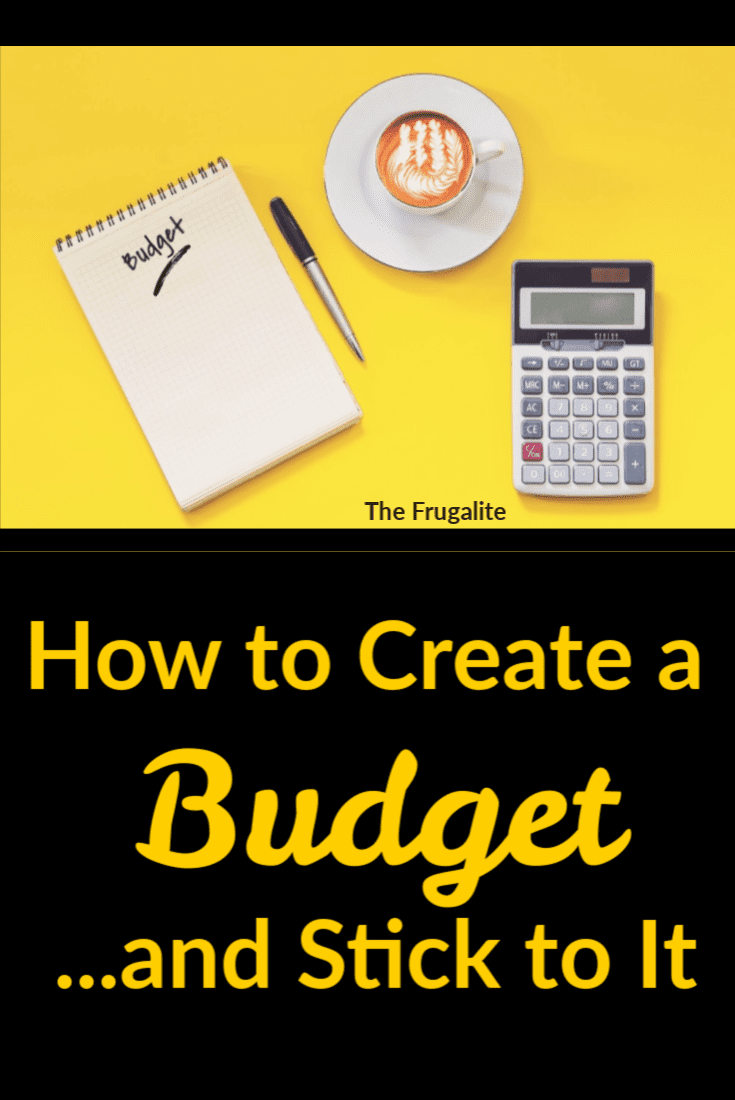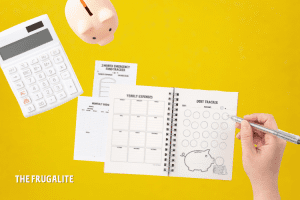(Psst: The FTC wants me to remind you that this website contains affiliate links. That means if you make a purchase from a link you click on, I might receive a small commission. This does not increase the price you’ll pay for that item nor does it decrease the awesomeness of the item. ~ Daisy)
Lots of experts will give you excellent advice on how to create a budget. Creating a budget is actually pretty easy. You figure out what your expenses are, take this from your income, and then figure out what to do with the money you have left over.
Sticking to the budget…that’s the tough part.
This is where most people experience financial failure. They know what they should be doing, but that little treat is just calling out to them, and they think, “One off-plan expense won’t matter.” Or perhaps they have a spouse who is not really on board with the whole budget business and they are constantly playing catch-up because of unplanned expenses. The economy has taken a lot of hits recently, so it’s important to get control of your finances NOW.
With careful planning, you can keep everyone happy, have the occasional treat, and still stick to your budget.
Budgeting is like dieting.
Really, if you think about it, a budget is a lot like a diet. Everyone hates doing it, but sometimes our pants won’t zip and we’ve got to do something about it.
So, you figure out what your caloric intake should be. Every bite of food you eat should be measured and accounted for and you subtract the amounts from your allotted intake.
Sometimes you have an off-plan meal – a piece of cake at a birthday party, a celebratory dinner out, or an ice cream cone with the kiddos. You have to account for this too, and you can’t do it too often, or your diet will fail.
Sometimes you have loved ones who sabotage your good intentions, either deliberately or thoughtlessly. They might be food pushers (come on, one bite won’t kill you), guilters (but I made this especially for you), or influencers (just because I buy chips doesn’t mean you have to eat them.) Whatever the case, the result can be the same – your careful plan is in shambles.
It’s exactly the same with money.
It is often the influence of others, no matter how well-meaning, that causes you to go over you financial “calorie limit”. If you plan carefully, you can allow yourself some wiggle room to enjoy something outside of your normal diet (or budget). For example, when dieting, if you know that you have a party to attend, you might eat fewer calories for a day or so leading up to the event so that you can splurge without guilt. When budgeting, if you know there is an outing planned, you might cut back a bit on the grocery bill that week in order to have extra money to spend during your event.
When dieting, if you want a treat, you can have it – but you might be eating steamed veggies for the rest of the day if that treat is the equivalent of your daily caloric intake. Likewise with spending, if you want a Disney vacation, you can have it, but you might need to live in your uncle’s car, since you won’t also be able to afford to pay for that, your mortgage, and your car payment. Eating whatever you want can have unpleasant consequences. So can spending whatever you want.
Here’s how to create a budget.
Most folks have created a budget before, so feel free to skip over this part.
Creating a budget is simple. In one column, you have your money in, and in another column you have your money out.
Money in might be:
- Salary from work
- Bonus check
- Tax return
- Alimony or child support
- Rents due to you from property you own
Money out might be:
- Mortgage/rent
- Utility bills
- Credit card bills
- Car payment
- Insurances
- Loan payments
- Groceries and miscellaneous spending
So your first step is figuring out those two totals. In most cases, your money in will be more than your money out. If it isn’t, you have a serious problem and you need to look at lowering your fixed expenses ASAP, or your financial problems will spiral so far out of control you’ll end up destitute.
Assuming you have some money left over, this is for your variable expenses. You may want to allot this money to savings, to preps, to paying off debt, or to spending money for the members of your family.
Are you surprised when you see the numbers there in black and white? Maybe you bring in more than you thought. Maybe you are spending more than you realized. Either way, now that you can look at it all on paper, the next part will be a lot easier.
Ditch the credit cards
If you are going to keep spending money using credit cards, then you might as well skip the rest of this article. You’ll be paying exorbitant interest if you don’t pay them off in full each month, and what’s more, it’s impossible to control spending when people can just swipe a card. This is especially true if other family members who are not as budget-conscious have access to the cards.
Lock them up in your safe and use them only when it is necessary. Then immediately pay the balance off in full.
Sticking to the budget
So, planning the budget is easy. Anyone who can do basic math can create a budget. But how do you stick to it and get your finances under control?
Control…that’s the key word.
This is the method that I use. Feel free to adapt it to your situation.
I have a bank account that I use specifically for fixed expenses. All of my payments out go through that account. Everything that is not earmarked for bills comes out of the account. I don’t carry a debit card with me for this account, to reduce the temptation of knowing I have that money there…maybe I could just buy this and replace the money real quick before the bills come out.
The money that comes out is immediately organized into…Altoid tins. (Finally another use for those little tins!) The tins go into the safe until they are needed. It’s like the envelope method, but in a different container.
If there is money left over after I’ve sorted my variable expenses into the Altoid tins, this goes into my wallet and is my spending money. I keep grocery money in (you guessed it) an Altoid tin in my purse.
When spending grocery money, the change and the receipt go into my tin. That way, I know I’m sticking to my budget for food. When the tin is empty, it means I’m out of grocery money. Sometimes I have extra money left at the end of the week, and that stays in the grocery money tin to allow me to make some large bulk purchases.
Some of the variable expenses that I delegate money to are:
- Emergency fund (Learn more HERE)
- Gasoline
- Groceries/pantry
- Medical expenses/dental care
- Vision care
- Clothes
- Spending money for family members
- Gifts (a little each week towards holidays, birthdays, etc.)
- Fun money (for road trips, school field trips, dinner out, and miscellaneous adventures)
- Garden supplies (this is my addiction! seeds, plants, tools, oh my!)
It’s important to prioritize these areas. Just because the tin exists, doesn’t mean that you have to put money into it each month. I’ve listed these in the order of importance in our family.
Just because there is money in the tin doesn’t mean it gets spent each month. The beauty of this is that you less frequently have a big expense that you haven’t planned for. If my daughter needs new glasses, the money is there, available for the appointment. If we want to go visit a museum or national park, we have some money set aside to do that.
Alternatively, if the tin is empty, the expense has to wait. Maybe the birthday celebration will be a bit more humble, the greenhouse will have to wait to be purchased for a few more months, or we’ll have to make do with clothing that is a little snug for a couple more weeks. Our entertainment will be limited to Netflix, a nature walk, or a trip to the library.
Like I said, the key to this is control. One person has to be in control of the finances. I’m not recommending that anybody become a tyrant, doling out nickels after a family member begs and pleads. However, if anyone can just go and help themselves to the money that has been budgeted, this is not going to work. Unless both partners are completely on the same page, the person with the best financial sense needs to hold the key to the safe. I know that if you’ve just been shaking your head, paying off the credit card bill, and belly-aching a little each month, that your family isn’t going to like this. You’ll probably have to listen to some adamant complaints. It will be worth it in the end when you have the peace of mind that comes with having your budget under control.
A budget is not about a total spending freeze.
Most people hear the word budget and automatically cringe, picturing a state of horrible deprivation, old clothes, and perhaps their big toes poking through that hole in their sneakers. Much like the word “diet” (see above) “budget” is thought of in negative terms.
I’m not going to lie…sometimes it’s like that, especially if things are really out of control.
But usually, at least after the first couple of months, it isn’t bad at all. Being on a budget doesn’t mean that you can’t spend money. It means that you plan for your expenditures so that you can afford the stuff of everyday life. It means that you pay for the necessities first and that you get the extras second. It means that you scrutinize where your money is going and you make certain that your purchases are worthwhile – do you really want that fancy meal out each week, or would you rather put that money towards a fun family outing at the end of the month? It means that those expenses that you know will come up (like new eyeglasses) will be planned for, and they won’t make an enormous dent when it’s time to pay for them, leaving you rolling pennies for gasoline to get to work.
Your two cents…
If you haven’t really been able to stick to a budget in the past, what has been the fly in the ointment? A partner who was not on board? Difficulty planning? Lack of control?
If you’re good at budgeting, what are some tips you can offer to those who find it challenging?
Let’s talk about it in the comments section!












8 thoughts on “How to Create a Budget…and Stick to It”
One of the most helpful things is to not look at budgeting as a punishment but as a liberator. Part of the world’s problem is that people are looked at as consumers and not as responsible citizens. Too many credit cards are handed out to college freshmen who are looking for ways to embellish on their new found freedom. This was a trap door that we did not see for one of our fledgling young adult children. UGH! What a mess. We had always been frugal and careful trying to show the way to get ahead with little money. We did not realize our adult-child was feeling so deprived. That one did get a part-time job which helped a lot.
So, I would say that parents should really try to do with a little less adult pleasures (really, finally grow up — maturity is measured by one’s ability to deny oneself) to insure their children do not feel deprived unnecessarily. The temptation is tough in an affluent society to have less than the average level of “enough”. Simple pleasures will just have to do. Picnics, beaching, camping, homemade birthday parties — there are so many things that are practically free that parents can provide without the black clouds and chains that debt can bring. I’ve gotten so used to doing without that I can now delight the grandkids with little special somethings like my parents and in-laws did for my kids. If we have good attitudes and lots of creativity, we can survive well enough to actually be happy.
I’ve arranged for as many bills as possible to go out a day or two after pay day, so that money isn’t sitting there, taunting me, lol
For a long time I had a really hard time making a budget because I was a waitress and my income varied A LOT week to week and month to month. I read a lot of budgeting articles and none helped me with this problem.
Weirdly, what ended up happening was I “reinvented” the envelope method (I had never heard of it and I just started doing it, with real envelopes, even LOL). But I never wrote down my income. I figured up my monthly fixed expenses and divided by 4. That was how much I needed to make in a week before I could spend anything. (Envelope: rent and bills). Then as I brought home my money every day (nice perk of waitressing, by the way) I would add it to the envelope. When that one was ready for the week, I would decide how to save or spend the rest of the money I made as I made it, stuffing other envelopes.
It’s still not a perfect system, but I was able to save A LOT more money that way than before, when I was helpless to budget. Sometimes you can’t predict your income. Don’t let that stop you from tracking your expenses.
That is a brilliant idea, Jessi! If you wanted to write it up in a bit more detail and send it to editor@theorganicprepper.com we’d love to publish it here on The Frugalite.
I have a different perspective on charge cards which vary by type as to what legal protection they provide in case of loss. This is in addition to the retailer beta testing I’m seeing where only charge cards are accepted for purchases alongside signs saying no cash accepted. In addition, with the growing trend for online purchases (which is rapidly destroying many of the longtime brick and mortar stores I grew up with) that leaves charge cards often as the only payment method — which leaves the question of which type to use — debit or credit?
If a bad guy manages to steal the data from your credit card (whether by a remote data skimmer if you don’t keep your cards protected … or by a far more frequently used electronic skimmer card stuffed into a retailer’s payment machine … like a gas station’s pump), your legal rights to get your stolen money back are far better with a credit card — but virtually non-existent for a debit card. That means that debit cards should be reserved only for vendors that are ultra-trustworthy. Otherwise stick with using credit cards that you can pay off completely by whatever monthly deadline date is relevant.
Paying monthly utility bills is a bit different. There you frequently have an option to either snail-mail a check or to pay with a draft on your checking account by phone — in addition to using charge cards. I don’t like the auto-pay option that 1) tempts you not to monitor the occasional changes in billing amounts, and 2) leaves you with no option in case of a company blunder (or in AT&T’s case some deliberate billing dishonesty after their cable was cut and replaced by a different company’s cable) some flat-out attempted corporate thievery.
I believe there is a category of expenditure missing from the article so far. That thought might be inspired by this quote from J. Paul Getty who famously said:
“The #1 guideline to success is you must be in business for yourself. When you work for someone else, you sell your time at wholesale to your employer, who then re-sells it at retail to the customer.”
Now I’m under no illusions that everyone has the skills, resources, knowledge and personality to create and run their own business. But for those who do, there’s usually some cost involved whether out of pocket, by loan, or some combination of both. Such costs are a legitimate category for one’s budgeting.
For others for whom their own business is simply “not in the cards” for a variety of reasons, there is still a budget category for costs involved in improving their skills to make possible greater earnings.
–Lewis
One missing category is retirement savings if you aren’t participating or don’t have any employer retirement accounts. Another tough one to budget so at least get an estimate of your social security (ssa.gov) to get glimpse of the future. Wages often don’t keep up in cost of living and social security certainly doesn’t. Something put aside is better than nothing put aside.
All monies are meant to be spent – just a matter of when and on what (or who).
I prefer to refer to it as “intentional spending”. And
Also consider what your priorities are. I think it’s always important to have a little “free” money, even if it’s only 5 dollars. It helps keep you from feeling deprived. As you pay off one bill it frees up more money and slowly you can live on a bit higher standard. Also, avoid the “I can’t” attitude but rather “what can I do” . Possibly hang out with friends, take in free events, see what delicious meals you can make for a small amount of money. Homemade bread smells delicious and tastes delicious too. Hearty soups are comforting and with bread, quite filling. Getting your bills and living expenses under control it a great stress reducer.
Making a budget and sticking to it are habitual behaviors. I prefer to think of it as an exercise program. No one decides to exercise and get in shape one day and runs a 10K race the next.
You have to build cardio and muscular fitness to do that. Many may benefit from incremental implementation in budgeting as well.
-Start slow.
-If you are spending more than you make, the first step is to, as you point out, to STOP.
-Set budget goals with an eye on 1 year in the future, then begin to reduce spending by a predetermined and increasing percentage. Say 10% for the first 3 months, then 15% for the next 3 and so on. After one year, set goals for 2, 5, and 10 years in the future.
-Get increasingly intentional about keeping track of all of the money you make and the money you spend. At the end of one year, you will be surprised !
-Consider joining a Credit Union and depositing that “left over” money in short term CDs. You will earn higher interest, be less tempted to spend the money because your access is more limited (but still available in an emergency), and many offer CDs that allow you to buy in increments of $100 or less.
Everyone’s financial situation and requirements are different. Make your budget and your financial goals fit for you.